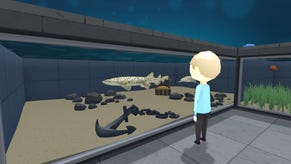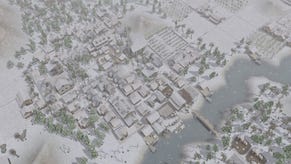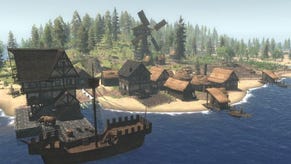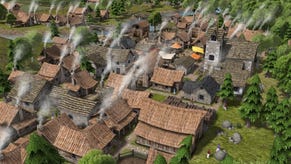Wot I Think: Banished
When five thousand fish ain't enough
Banished is an indie sandbox city building simulation, in which you have free reign to grow a nascent medieval town using only the resources gained from the land around it. You build and you harvest, and you keep your population healthy enough in order that they might breed and expand. It's out now, and I spent the weekend with it.
It made more sense once I decided that everyone in the town had tapeworm. Their prodigious appetites and the strange ease with which they would starve to death had more reason to it then. If I became frustrated, all I had to do was picture these weather-worn medieval folk shovelling endless amounts of fish, venison, potatoes, peppers, berries and mushrooms down their brown-toothed maws, only for the grim parasite in their guts to hoover half the goodness out of their rich harvest, leaving these peons hungry to the point of collapse.
Banished is a taxing game. It might even be a vexing one. Here's an example, from a relatively early stage of a game, although it still took a bloody long time to get there. (There's no campaign as such, by the way: you start with a randomly-generated map, immediate access to all buildings, and keep going/growing for as long as you can.)
- My town consists of roughly 80 people.
- Food is supplied by 12 fishermen, 7 farmers, 12 hunters and 8 gatherers. 39 food workers total.
- Firewood is supplied by 16 foresters providing logs to 4 woodcutters (any more woodcutters and they'd have nothing to do, lest that sound low). 20 fuel workers total.
80 people. 39 food workers. 20 fuel workers.
And yet they are starving to death. And yet they are freezing to death. There is some imbalance I can't understand - how could a ratio of almost one food worker to every two people fail to provide enough? (Yes, I have been careful to spread fields, cabins and barns out so no-one has to make long, hungry treks for sustenance). Is everyone obscenely greedy, or is everyone extremely lazy? Perhaps the population count is representative rather than exact, and that 70 refers to an abstract grouping rather than the full total - but why, then, would the same not apply to the number of food workers?
I need to make yet more food, and I need to make yet more firewood: every two or three new citizens seems to increase demand on these key resources by the sort of degree you'd expect from a decent-size army. Everything I'm doing is with the intent of making my population grow, but making my population grow is essentially fatal to it. So I'm scrabbling to lay on more farmers, more hunters, more fishermen, more lumberjacks, but I'm constrained by landmass, I'm constrained by resource cost, and most of all I'm constrained by available labourers, builders, farmers, fishermen etc etc etc because almost everyone I have is tasked with providing the existing food supply.
Desperately I switch people away from mining and from medicine, from teaching and from tailoring, trying to find just one or two souls who will provide just that bit more food or put that new hunter's cabin up quickly enough that no-one will perish during the wait, but as I do three people die from old age - and there's no-one to replace them, not until the students come of age. Then a fisherman drowns. Then a quarryman is crushed by falling rock. In one sense, it's horrible. In another perhaps it relieves the strain on the food supply.
But it doesn't, because some of those who died were fishermen and gatherers. There are fewer mouths to feed, yes, but there are fewer hands to do the feeding too. Where else can I pull people away from? Only from food. Only from firewood. All I can do is wait for children to become students to became adults, but even those who don't starve of freeze while I wait take forever about it, and wind up only replacing those who have most immediately perished rather than truly replenishing numbers.
I am stroppy now, but more than that I'm tired. It's a fight. The death toll mounts and mounts, and too often I face events such as finally recruiting a new fisherman, only to be told seconds later than another fisherman has died. One step forwards, two steps back, all the time. This is a war of attrition against my patience and my obstinance, as I stand grimly against a tide which will not pause, a chain reaction of mortality. By this point - and it is a point I have faced several times, in several towns - there's only one option left to me, and that is to go back to a far earlier savegame, if I have one. There is no rescuing this situation.
I know roughly what went wrong, and that is that, during a time of relative plenty, I actively chased expansion rather than first laying all the groundwork which would support it. I should have built field after field, fishing dock after fishing dock - but that would still leave me with the problem of where their staff come from. And with how to provide staff for firewood, and for the herbalists which stop everyone dying young of disease, and feeling too unhealthy to breed children. Where would I have switched people from? What, among the essential, was non-essential? How can I possibly reached the hallowed situation whereby there's enough young'uns hanging around to immediately replace all those who so relentlessly die of age? How can I do that when the very presence of young'uns places such a high demand on their families' and neighbours' food supply that people are starving even when fully half the population is dedicated to generating food?
Children are our future. They are also our doom. In this, Banished is an unsettling allegory for human population growth. It is less successful at being a game with highs and satisfactions. It is pure chore, pure punishment.
Apt, I suppose, for the harsh, unforgiving world of base-level survival it represents. Apt, too, if it wants an audience who demands painstaking strategy and planning rather than any amount of carefree noodling when it comes to town design. But Christ, such work.
I've spent three days obsessed with Banished, and yet I don't like it. I was obsessed because I was determined to find a way to break its back, to succeed even when its severity and its strange logic worked so hard to punish me. I don't like it because it is so short on breathing room, so determined to stack the odds against me, that there is no scope whatsoever to enjoy the act of city-building. While no head turner, it is perfectly attractive, but that matters naught when it's not paired with any excitement. I want to be challenged, sure, but I also want to be able to sit back and say 'guys, just look at what we've made.'
I don't like it because not a one of its structures or inhabitants creates a sense of joy or accomplishment when created. Whatever I might construct is another brown (or occasionally grey) shack, whose only visible effect - if I'm lucky - is to slightly slow the decline of one of the game's many numbers. Let's say that number is firewood. Let's say that number was about 200 and falling fast, raised to about 400 and not immediately falling - but two or three more citizens and it will. What am I to divine from that? What does that number, changing dramatically all the time, really tell me about my citizen's needs, and their demands? Games have forever been about the balancing of numbers, but here the numbers take over - I don't know what 400 firewood means. All I know is that I need to stop that number from declining to sharply.
And so Banished, even during calmer times, is about the panicked, incessant second-guessing of those numbers. Once I've got firewood holding steady, I immediately need to turn to increasing the number of buildings for food again, or to medicinal herb-gathering again, or to quarrying again: there's no hope of a moment of triumph, because if you've done well the population swells faster and doom arrives faster. There aren't even any just-for-showing off buildings to aspire to: everything in Banished is purely about subsistence.
Which is why I admire it at the same time as not liking it. Perhaps, as I wrote about Far Cry 2 last week, this is a game that's absolutely dedicated a single, clear ethos of suffering and danger. Go into it expecting something which gives you freedom to be playful and experimental and you're going to get slapped down. Go into it expecting a brutal challenge, a thematic reflection of the everyday trials and agonies of a pre-technology society, and at least then you can't be told - as I may be - that you're 'playing it wrong.'
I fully and happily accept that I did not go into Banished with that mindset. I did, at least, stick with it even whilst in the grip of great frustration because I was determined to work out how it ticked, how to overcome its inhabitants' deadly growth and almighty hunger. I can see that, if I wanted to challenge myself further, to mine deep for the rarer thrill of a job expertly accomplished rather than simply a building game indulged in, it would give me that.
This doesn't excuse the woeful interface, how it presents itself as prettily minimalist but in fact you need to manually keep open and arranged several, heavily statistical and visually tedious windows throughout, and that you will spend the majority of your time squinting at their comments rather than paying attention to anything in the game-world itself. For instance, only disaster-related deaths warrant a notification icon - starvation, accident, freezing, that sort of thing. The far more commonplace old age deaths go unremarked, and are identified only be spotting that the number denoting total adults has decreased. You then need to refer to the log window in order to find out who's died, what their job was, and if anyone was available to replace them or not.
Important edit: I am informed that there is in fact an option to turn on additional death notifications. Whether my not seeing it is a matter of my being an idiot or the UI not making it sufficiently visible is a matter for debate.
For example, here's an average view of Banished.
For your information, there's a house, and a gatherer's hut, and a storage barn, some relatively mature trees, and some rain - but nothing at all in this screenshot matters one iota - except for the bits I've marked with 1 and 2.
Let's take a closer look at number 1:
The red asterisk marks what I needed to have noticed. 65/16/29 refers to the number of adults, students and children in the town. The latter two types will eventually become the former, so a big part of Banished is making sure you have that supply chain of future workers ready to step into the boots of the fallen. What's just happened is that the first number has dropped from 66 to 65. The game didn't tell me this - I just had to spot the change by keeping an eye on this tiny window. In order to understand the effect of it, I had to take a look at reference 2:
So, 66 went from 65 because a gatherer died. Gatherers provide nuts and berries and root vegetables, which while a lesser part of the overall food picture than wildstock and crops are still pretty damned essential - for population health as well as hunger. So a gatherer dying is a problem. Not having anyone working as a general labourer means no-one will automatically replace that gatherer - instead I'll need to switch someone out of another, more than likely equally vital, role to cover this, or to wait for a student to come of age.
That is a lot of busywork and close scrutiny in order to ascertain one single fact: a gatherer has died and you need to replace them manually. That's just an example of how the game's opaque systems are unhelpfully presented, not a lone gripe. I should also note at this point that all these windows are closed and hidden by default: the game doesn't seem to think you even need to see this stuff. You really do. Now, it's certainly true that someone more on top of their game, a better strategist, would not have gotten into a situation whereby there are no general labourers about, and could instead rely more on the circle of life to keep things going. While I might maintain that the game is too unforgiving to make that feasible, and while I might also maintain that such a struggle is the very point of Banished, this does not excuse how poorly the information is presented, and what a fussy chore it is to extract simple but vital data from this game.
It's not Sim City (and thank God for that). It's a little indie thing with a fraction of the resources of a more mainstream city builder game, and wasn't ever going to have a raft of interface designers at its disposal. But I can't give it a free pass for that. In a game like this, UI is all, and UI is where it most stumbles. Even switching people between roles is drawn out clunky business, despite multiple ways in which to do it. I could have done it from this main grid, which is quickest but means you have no idea exactly which buildings you're drawing from:
Or I could have manually gone to relevant buildings - for instance a quarry and a farm - and adjusted the staffing levels to suit. What I can't do is tell who exactly I'm pulling away or what the direct consequence of it will be. Most of all, I'm just clicking tiny arrows to adjust abstracted numbers, and that is what Banished really is. There's this patina of semi-pretty medieval farming, but it's far too evidently a skinsuit hung loosely over dry, fiddly statistical bones. That's what city sims are, yes, but jeez, did you have to be quite so blatant about it? And despite a nice line in randomly-generated names and, if you're prepared to stare at that tiny, texty event log all the while, a certain bittersweetness to seeing kids come of age, go to work, have their own kids and then die, there is no meaningful way to engage with or even witness your populations' lives. There's only watching the numbers. And the numbers are against you.
Indeed, when you look beyond the numbers and at the people instead, with their names and genders and ages, all is totally random, at least in terms of applying logic to who's having children, who's coupling with who and who's turning from child to dead 70-year-old in the span of five winters. There is, I fear, quite a lot being swept under the rug here, trying to fool us into thinking more is simulated than it really is. Similarly, or perhaps as a result, there's none of the gonzo surprise element one would find in, say, the similarly unforgiving Dwarf Fortress: there are no people stories here, no humanity, just numbers relentlessly going down as you relentlessly fight to keep up.
Aside from interface complaints, I would not really call Banished a bad game. I would also not call it a pleasant game. It is a game about strife, and it is a game about relentlessly balancing a spreadsheet. It is a game whose internal logic is not always relevant to external logic, and it is a game which has failed to truly marry world with UI. It may be a game for you - I do expect a passionate community for form around it. I tried my best, but it was not a game for me.
I wish it was, because I really do admire it. I admire that it's sworn such fealty to raw survival, to simply staying alive rather than thriving or luxury or capitalism or conquest. I admire that, for all its humdrum appearance, it's such a different beast to other city-builders. I admire its brutality, and its purity. I admire that it's clearly a labour of love, and certainly an impressive accomplishment given its humble origins. I just wish I liked it too.
Banished is out now.
















